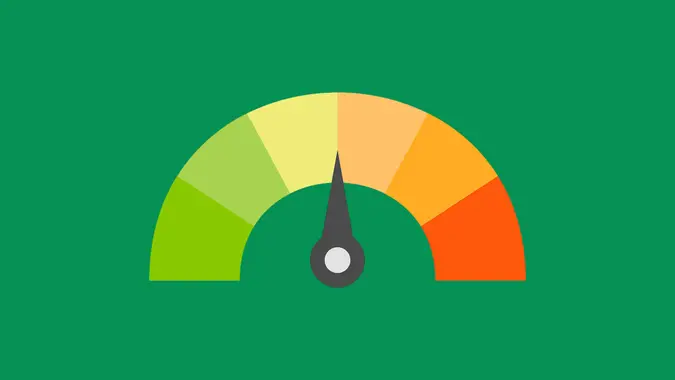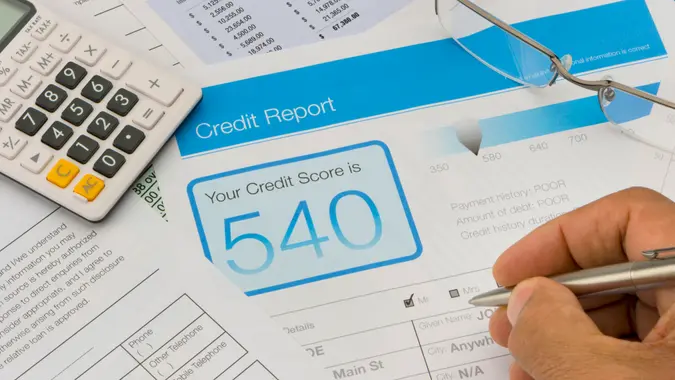How Often Should You Check Your Credit Report?

Commitment to Our Readers
GOBankingRates' editorial team is committed to bringing you unbiased reviews and information. We use data-driven methodologies to evaluate financial products and services - our reviews and ratings are not influenced by advertisers. You can read more about our editorial guidelines and our products and services review methodology.

20 Years
Helping You Live Richer

Reviewed
by Experts

Trusted by
Millions of Readers
Experts generally recommend checking your credit report at least once a year. Every year, you’re entitled to one free credit report from each of the three main credit bureaus:
- Experian
- Equifax
- TransUnion
You can also use the federal site AnnualCreditReport.com
How to Get the Most Out of Your Free Credit Reports
Instead of checking them all at once, space them out throughout the year. That means you can review your credit report from a different bureau every four months. This way, you’ll constantly stay updated without paying a dime.
For example:
- January: Check Experian
- May: Check Equifax
- September: Check TransUnion
When Should You Check Your Credit Report More Frequently?
While once a year is good advice for most people, certain life events or situations may warrant checking your credit report more often:
Before Big Financial Decisions
It’s always smart to check your report before making significant financial moves, including:
- Applying for a loan, like a mortgage, car loan or personal loan
- Signing up for a new credit card
- Renting a new home or apartment
Knowing exactly what’s on your report ahead of time gives you a chance to correct mistakes or handle surprises that could affect approval.
After Any Suspicious Activity
In today’s digital world, identity theft and data breaches are all too common. If you’ve ever experienced:
- Unauthorized charges on your accounts
- Notification of a company data breach involving your personal info
- Strange collection notices or unexpected bills
You’ll want to review your credit report ASAP to ensure nobody is using your credit illegally.
When Actively Improving Your Credit
If you’re making efforts to boost your score, like paying off debt or disputing errors, regular credit checks help you track your progress and make sure your hard work is accurately recorded.
How Can You Check Your Credit Report for Free?
Here’s a straightforward way to get your reports safely and free of charge:
- Go directly to the website of the bureau
- Fill out a short form verifying your identity (basic personal questions)
- Instantly download your credit reports and review them carefully
It is important to note that AnnualCreditReport.com doesn’t show your credit score, only the report. If you want to see the score, you’ll have to use your free credit reports from the credit bureaus.
What to Look for When Reviewing Your Credit Report
Now that you know when to check, let’s talk about what you should be looking for. Your credit report includes:
- Personal details: Check for typos in your name, address, date of birth and Social Security number
- Credit accounts and balances: Verify that every line of credit mentioned belongs to you and has the correct balance
- Payment History: Look for any incorrect late or missed payments that are lowering your score
- Credit Inquiries: This lists companies that checked your credit (like lenders when you apply for a loan). Make sure you recognize each inquiry
- Signs of Identity Theft: Accounts you didn’t open, debts you don’t recognize or unexpected collections activity
Spot something incorrect or unfamiliar? Dispute it promptly through the bureau reporting the issue.
Can Checking Your Credit Report Hurt Your Credit?
Absolutely not — this is a common myth! Checking your credit is called a soft inquiry. It doesn’t lower your credit score, no matter how frequently you check.
Hard inquiries, which occur when lenders review your credit after a loan or credit application, are what can temporarily lower your score. Your personal credit check is safe and healthy financial behavior.
Why Regular Credit Checks Protect Your Score
Checking your credit report regularly is proactive, not obsessive. Here’s how staying engaged protects your financial well-being:
- Catch Mistakes Early: Even minor errors can impact loan approvals or credit terms. Catching mistakes early helps prevent larger financial headaches down the line
- Detect Fraud Immediately: If your identity is stolen, quick action limits the damage significantly
- See Your Progress Clearly: When improving your credit, regular checks let you celebrate progress, like watching your score rise after paying down a big balance
Staying aware sends lenders a positive message, too — that you’re a responsible borrower worth trusting with credit.
How Often Should You Check Your Credit Report?
Here’s a quick recap of everything you need to remember:
- Check at least annually, but ideally three times a year (one bureau every four months)
- AnnualCreditReport.com is backed by the government
- Regularly checking helps you catch errors, fight fraud and improve your credit
- Reviewing your credit never hurts your score
Ready to take control of your credit? Want to keep learning? Explore these helpful articles next:
Keep Improving Your Credit Knowledge:
- When Do Credit Scores Update?
- Easiest Ways to Boost Your Credit Score
- What is a Good Credit Score and Why Does It Matter?
FAQs About How Often You Should Check Your Credit Report
Here are simple answers to common credit-reporting questions you might still have:- How often should you check your credit report each year?
- Ideally, three times per year -- once every four months using the free reports from each major credit bureau.
- Does checking your credit report lower your credit score?
- Not at all. Checking your credit report yourself is a soft inquiry and never harms your score.
- What's the safest way to get a free credit report?
- You can use AnnualCreditReport.com, the federally authorized website. However, you will have to go through a credit bureau to see your score.
- Should you check your credit before applying for a loan?
- Yes, always. It helps you find and fix mistakes before lenders review your application, improving your approval odds.
Editorial Note: This content is not provided by any entity covered in this article. Any opinions, analyses, reviews, ratings or recommendations expressed in this article are those of the author alone and have not been reviewed, approved or otherwise endorsed by any entity named in this article.
Our in-house research team and on-site financial experts work together to create content that’s accurate, impartial, and up to date. We fact-check every single statistic, quote and fact using trusted primary resources to make sure the information we provide is correct. You can learn more about GOBankingRates’ processes and standards in our editorial policy.
- FTC "Checking Your Credit Report"
- FTC "Free Credit Reports"
- FTC "IdentityTheft.gov"
- AnnualCreditReport.com "website"
- Social Security Administration "Social Security Numbers"
- FDIC "What is a credit inquiry?"
 Written by
Written by  Edited by
Edited by 






















